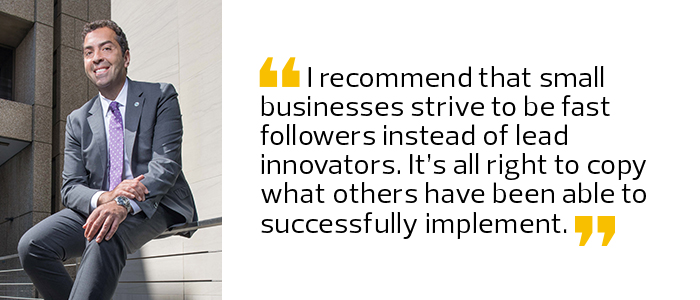Q&A: Ayman El Tarabishy on How IT Can Level the Playing Field for Small Businesses
Smart IT investments can help small businesses level the playing field against larger rivals, argues Ayman El Tarabishy, executive director of the International Council of Small Business, professor at The George Washington University and co-author of Information Technology for Small Businesses: Managing the Digital Enterprise.
In a recent conversation with BizTech, El Tarabishy discussed the opportunities that small businesses can exploit using technology and the challenges those businesses must surmount.
BIZTECH: Beyond the basics, what technology categories do you regard as vital right now for small business?
EL TARABISHY: Two things, in particular, strike me as vital for small businesses: the growth of the cloud and cloud-based services, and the introduction of financial services technologies.
The use of customer relationship management tools in the cloud has been a serious game changer. This reduces the need to have tools in a localized place. Small businesses now have more resilient and continuous operations and can respond to unexpected challenges, including acts of God, thanks to their use of the cloud to retain and manage data.
More and more small businesses are also using mobile-friendly transaction technologies, including point-of-sale solutions that enable the use of credit and debit cards and those that enable remote person-to-person and person-to-business transactions. These types of fintech tools have become vital for small businesses and make it possible for them to participate in the exponential growth of a cashless society.
BIZTECH: What advice do you have for small business leaders who are evaluating technology deployment opportunities?
EL TARABISHY: The effective use of technology can help a small business grow their revenues sustainably. But being the first mover on technology is not always best. I recommend that small businesses strive to be fast followers instead of lead innovators. It’s all right to copy what others have been able to successfully implement. Sometimes, waiting is more strategic.
BIZTECH: How can technology help small businesses differentiate themselves from their competitors — especially large ones?
EL TARABISHY: Small businesses are not usually able to compete based on volume and must differentiate themselves by providing quality service and a customized product. The keyword is customization — or, better yet, personalization. There are, however, challenges to creating more personalized offerings across many products. The cost can be prohibitive for a small business.

3D printing technology in manufacturing is one technology that’s being used to provide this personalization and customization by small businesses. We know that personalization is driven by small businesses, while customization is driven by the consumer. Consumers provide the specifications. 3D technology and associated software allow the consumer to go online and input the specifics that they need. This reduces the lead time for new offerings and makes the business model more sustainable.
BIZTECH: What holds small businesses back from making the IT upgrades they should make?
EL TARABISHY: There are different classes of small businesses. Some are early adopters of technology, while others are laggards.
Cost and lack of knowledge are the key reasons small businesses are hesitant to make IT upgrades. New technology is entering the marketplace all the time. Most small businesses aren’t in the business of selling technology; they are in the business of using technology to be competitive in the marketplace.
The key is using IT to make them better and more customer-friendly. It is not just about offering the latest technology.
BIZTECH: What are the largest tech-related challenges small businesses face?
EL TARABISHY: The No. 1 challenge for small businesses is security: the protection of vital assets, both on-premises and in the cloud. Technology has allowed small businesses to be more mobile by placing key assets in the cloud. The cloud is susceptible to hacking, just as on-premises data centers are. This is a huge concern and will continue to be. Hacking also includes false websites being created that mimic a small business’s website. There are many things that are out of small businesses’ control.
BIZTECH: Any advice on how small businesses can recruit and retain IT pros?
EL TARABISHY: IT staffing is especially challenging for small businesses because traditionally, small businesses pay less than large businesses and offer fewer benefits.
There are a few ways to overcome these challenges. Small businesses can offer employees broader experience than a large business. They might also offer more flexible work schedules. For those who are motivated to one day own their own business, working for a small business is a great experience. These are some of the selling points a small business could make to job candidates.
Small businesses should also recruit at vocational schools and incorporate cooperative education in their hiring. At community colleges and universities, for example, they might find students who could work part time. This could be a pipeline for future employees.
BIZTECH: How do you think the nature of small business might change in the next few years as a result of technology advances?
EL TARABISHY: The future of small business has been an ongoing topic. Look at how technology has already changed small business, in just the past few years. Tech has allowed entrepreneurs to start businesses with fewer people and at a faster pace.
Entrepreneurship is also expanding into many underserved communities, including urban and rural areas. The internet and social media allow small businesses to market their services all over the world. LinkedIn has become an important resource to search for talent.
Thanks to the advent of new technologies, small businesses are ideally suited to provide effective and sustainable solutions.









